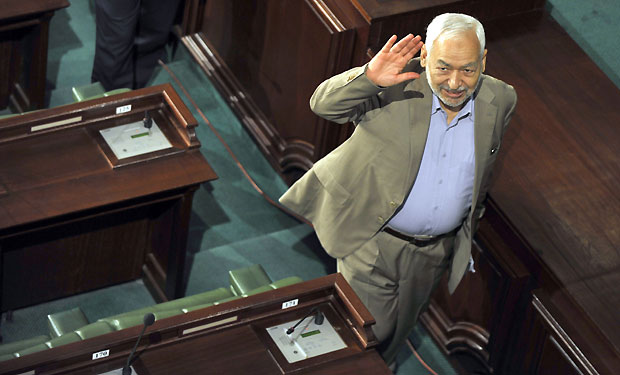
Islamist leader Rached Ghannouchi leaves the hall after Tunisian deputies interrupted the presentation by the head of the drafting committee of the draft consontitution, on July 1, 2013, in Tunis. (AFP/Fethi Belaid)
London, Asharq Al-Awsat—Rachid Ghannouchi, leader of Tunisia’s Islamist Ennahda Movement, stressed that the Egyptian scenario will not be repeated in Tunisia.
Ghannouchi spoke to Asharq Al-Awsat after some Tunisian activists announced the launch of an opposition Tamarod (Rebellion) campaign aimed at toppling the Tunisian Constituent Assembly which is now in the process of drafting a new constitution for Tunisia. It was the opposition Tamarod campaign in Egypt that organized the June 30 protests that ultimately toppled Egyptian president Mohamed Mursi from power.
At a press conference earlier this week, Mohammed Bennour, the organizer of the Tamarod campaign in Tunisia, revealed that the Tunisian movement is “aiming to topple the Tunisian Constituent Assembly that is in the process of drafting a constitution aimed at the institution of a non-democratic state.”
Speaking exclusively to Asharq Al-Awsat, Ghannouchi said that some people might “ignore the facts and the difference in time and place [between Tunisia and Egypt], committing a deductive fallacy.”
Despite this, he did not deny that the situation in Tunisia is being influenced by what is happening in Egypt. He said: “This influence is not immediate; rather, it is commensurate with how similar the situation [in the two countries] is.”
“Egypt was influenced by the Tunisian revolution because the situation was similar, but currently we stress that the status quo [in Tunisia] is different. We in Tunisia have offered compromises in terms of the constitution so that it will represent all Tunisians,” he told Asharq Al-Awsat.
Ghannouchi continued: “We live under a national unity government and there are three heads of authority each of which is affiliated with a large and well-known party and all take part in the rule.”
The Sunni Islamic thinker demonstrated that his ruling party has made these compromises in a bid to avoid ideological polarization and bring as wide consensus as possible to the new government. He added that Ennahda pursued a serious strategy aimed at achieving consensus between the Islamist and the modernist trends, and thus spare Tunisia the danger of division.
Commenting on the difference between the Ennahda Movement and the Muslim Brotherhood in Egypt, Ghannouchi stressed: “Each [faction] has a special condition. As for our situation in Tunisia we called, and continue to call, for a democracy based on legitimacy, consensus, and dialogue…to ensure the success of the transitional period.”
“We have made sacrifices. For example, we relinquished key ministries for the sake of consensus and in order to avoid division,” he added.
As for the Tunisian military, Ghannouchi insisted that it is different from the one in Egypt. “While Egypt was ruled by the military for 60 years, our national army remained away from politics that is why we credit it for committing itself to its task which is safeguarding the country’s national and pan-Arab security,” he said.

Trackbacks/Pingbacks